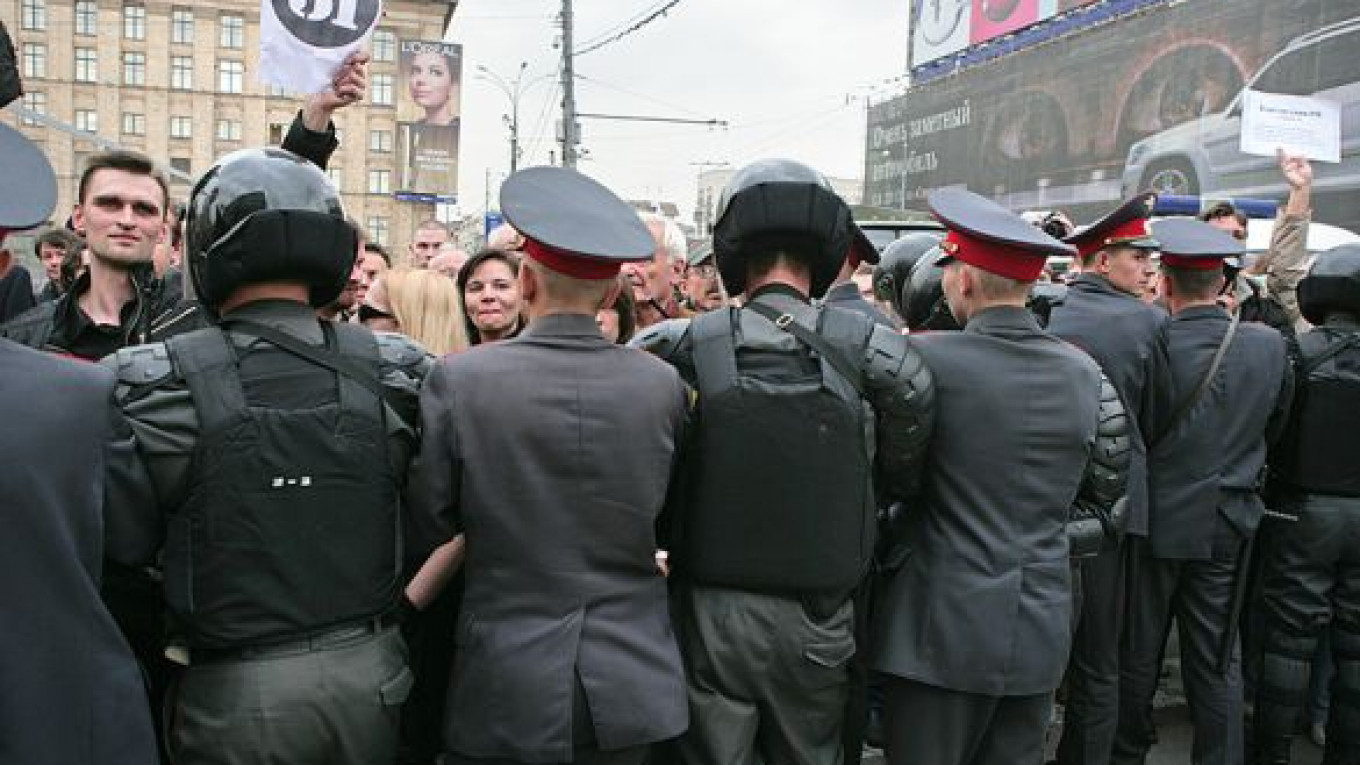The government's rhetoric on freedoms has changed and activism is growing, but police crackdowns on protesters and attacks on journalists have continued in a climate of impunity, Amnesty International said Friday.
The human rights group, in its annual report, also said President Dmitry Medvedev's efforts to end police violence, legal impunity and unfair detention have been "piecemeal" and done little to curb frequent rights abuses.
The Foreign Ministry criticized the report as "politically biased" and accused Amnesty of using rights rhetoric to apply political pressure on the government.
In the three years since Medvedev promised to fight graft and widespread flouting of the law, the authorities have voiced more support for freedoms, and people have shown more willingness to fight for their rights, Amnesty said. But the authorities, it said, continue to crack down hard on political opponents and others.
"In the last three years people have less fear to go out into the streets. … We have seen a growing activism among the population," said Amnesty's Russia expert, Frederica Behr. "But at the same time we have seen harsher methods by the authorities to clamp down on dissent."
Mayor Sergei Sobyanin, who took office last fall, ended a City Hall ban on protests by rights and opposition activists on the 31st day of every month to draw attention to Article 31 of the Constitution, which guarantees the right of assembly. But not all opposition activists have been allowed to rally, and police have detained opposition leader Eduard Limonov and his supporters for trying to rally with other so-called 31st Strategy activists.
City Hall has also eased a blanket ban on gay rallies.
At the same time, people have been drawn to public activism over issues as diverse as driver's rights and the deforestation of the centuries-old Khimki forest outside Moscow.
But participants in those protests have also faced police harassment and detention.
"In spite of a stated desire for police reform, corruption and collusion between the police, investigators and prosecutors were widely perceived. … There were frequent reports of torture and other ill-treatment by law-enforcement officers," the Amnesty report said in summing up Russia's rights record. "Judicial reform continued to be presented as a government priority. However, reforms remained piecemeal and had only a limited impact."
It cited the December sentencing of former Yukos CEO Mikhail Khodorkovsky, who is to remain in jail until 2017 following his conviction in a second trial, as an example of political pressure on the justice system.
"It's, of course, positive that Medvedev has repeatedly expressed respect for human rights organizations and independent media, called for greater independence of the courts, but so far this has not realized itself into real action," Behr said.
The Foreign Ministry dismissed the Amnesty report, saying in a statement: "We would like to stress that it is unacceptable to use the dialogue of human rights in order to put political pressure on certain states, creating a distorted view of the efforts made by national government in the human rights sphere by the international community."
It also said rights groups' reports amount to mere "speculation" and Russia would look to United Nations reports on rights for its guidelines.
"It is these [UN reports] — and not the speculations of the authors of the analytical reports, who have appropriated the status of 'international arbitrators' — that are a reference point for us in seeking ways to overcome existing problems," it said.
In February, UN rights chief Navi Pillay said attempts by Medvedev to improve the human rights situation have fallen short, echoing the Amnesty report and criticism long expressed by foreign governments.
(MT, Reuters)
A Message from The Moscow Times:
Dear readers,
We are facing unprecedented challenges. Russia's Prosecutor General's Office has designated The Moscow Times as an "undesirable" organization, criminalizing our work and putting our staff at risk of prosecution. This follows our earlier unjust labeling as a "foreign agent."
These actions are direct attempts to silence independent journalism in Russia. The authorities claim our work "discredits the decisions of the Russian leadership." We see things differently: we strive to provide accurate, unbiased reporting on Russia.
We, the journalists of The Moscow Times, refuse to be silenced. But to continue our work, we need your help.
Your support, no matter how small, makes a world of difference. If you can, please support us monthly starting from just $2. It's quick to set up, and every contribution makes a significant impact.
By supporting The Moscow Times, you're defending open, independent journalism in the face of repression. Thank you for standing with us.
Remind me later.






